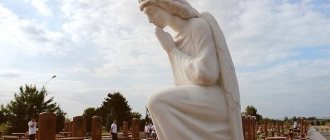Bible lessons
Published 04/05/2017
Why does God allow evil and injustice in human life? Most likely, every believer has asked himself this question at different stages of his life. If God is so loving, can't He save people from suffering? Why does God allow these bad things into the lives of people, especially believers? We will try to find answers to these and other questions in our article. And Gordon Ferguson, a famous Christian teacher and author of many books, will help us today.
Why God Allows Evil: Understanding the Problem of Suffering
The problem of understanding the reasons why God allows evil or the existence of evil is a big obstacle in the initial formation of faith in God. Even after we have come to faith, Satan will use this problem to try to lead us astray during difficult times in our lives. Several years ago I read a short but well-reasoned book by Thomas Warren called Have Atheists Proved There Is No God? Over the years, I have not found a better book on this topic from a logical point of view. I ended up writing a lesson presenting the main arguments of the book in sermon form. The material in this article is adapted from that sermon first preached many years ago.
As you consider this topic, keep 2 things in mind:
- No matter how many explanations may be given, the critical question will always be whether we exercise faith in the face of life's storms.
- Although logic and reasoning cannot remove from our lives those necessary obstacles that faith must overcome, yet many unnecessary obstacles can be removed by practical explanations. It would be a big mistake not to remove these unnecessary obstacles from our lives.
Undoubtedly, one of the most challenging obstacles to faith and trust in God is based on the question: “Why does He allow bad things to happen to good people?”, as we often phrase it. The average person would phrase their question something like this: “Why does God allow disease, evil, famine, natural disasters, and atrocities such as war, murder, violence, and child abuse?” An agnostic would express his concern this way: “If God desires evil, then He is not good. If God does not will evil, but it happens anyway, then He is not omnipotent. Therefore, since evil exists, God lacks either goodness or power.” And an atheist would speak out even more forcefully: “A good and omnipotent God would destroy evil completely. But evil exists. Which means there is no God!”
Atheist explanations are not enough
The statement that God does not exist because there is evil in this world is a contradictory statement because if God does not exist, there is also no such thing as “evil.” If there is no God, there is no objective morality. Everything is subject to subjective definitions and personal interpretation.
For example, the theory of evolution states that the fittest and the fittest survive. Therefore, when we travel through Africa and watch a tiger eat a zebra, we do not conclude that the tiger is “evil” or that it should be punished and put in a prison cell. Instead, we marvel at the wonders of nature. If there is no God, then there is absolutely no difference between us and animals. And a person who kidnapped, killed and ate another person is simply a strong animal that survives at the expense of another, weaker one.
Definition of basic concepts
Before we continue, we need to define some basic concepts. Definitions of “good” and “evil” are vital. The only real evil is what the Bible calls “sin,” because sin destroys our relationship with God and with our neighbors. On the other hand, the only true good is Biblical “righteousness,” that which is always good, that which develops our relationships with God and other people. We can call an “instrument of evil” something that ultimately leads people to do the wrong thing (to sin). These may be “stumbling blocks” or “stones that pave the way,” but they are not inherently evil. And we can call “an instrument of good” that which leads a person to true good.
Thus, the same incident can be both an “instrument of good” and an “instrument of evil,” depending on how a person looked at it and how he reacted to it. Illness is a good example of what can be both a blessing and a curse. A health problem can move a person to either slander God or turn to God, depending on that person's heart. In fact, pain in itself is not necessarily evil. It may simply be a symptom of a health problem that motivates a person to get the help they need, or it may be the inevitable result of life-saving surgery.
Definitions of some of God's qualities are necessary for our understanding of the problem of good and evil. When we say that God is “all-knowing,” we are saying that He knows everything there is to know. For example, He knew in advance that man would sin and would need atonement. Therefore, He created the world with this in mind - a world suitable for the spiritual development of man. Our world was never meant to be an eternal paradise - that's what Heaven is meant for!
When we say that God is “omnipotent,” we recognize that He can do everything that is in principle possible to do. However, some things are impossible by definition. For example, can God create a rock so big that he cannot lift it, or can God create a square circle? Questions like these give the impression that if God had more power, He could. But the fact is that some things are not a matter of power, not even God's power! He will do only what is in harmony with His nature. He will not and cannot lie, for example. And it will not interfere with human free will. To describe God as just is to say that He should reward good and punish evil. Because He created man as a being with free will, His justice requires that He allow man to make real choices.
Why did God allow the Fall?
Human freedom is mysterious and incomprehensible. Why does a person suddenly commit this or that act? If it can be strictly explained, then this is no longer freedom, but an action determined by certain reasons. Adam and Eve decided to express their freedom in this way. Why did God have to prevent the Fall? Unclear. He would then contradict Himself: first give freedom, and then prevent its manifestation.
Yes, the Lord knows everything. But His Providence is different. Providence is when God turns evil, committed by the free will of someone, into good. God's providence does not act because it is necessary to prevent evil or sin conceived by people. He can correct a sin that has already been committed, turn evil to benefit someone, but he cannot undo what was done by a person’s free will. Because then a person is reduced to the level of some kind of puppet, and the Lord thinks differently about a person.
The freedom given to us is the other side of love. You can't love by force. You can't force love. God doesn't want that kind of love. Love manifests itself in obedience, in self-denial, in some kind of sacrifice. Man's love before the Fall was natural, not hard-won. For her to become like this now, she needs to pass a test, a temptation. And even if you fall and do not go through difficulties with dignity, then there is the opportunity to repent in order to return to this love again. And this path is especially valuable when, having the opportunity to retreat, we remain faithful, or even retreating, we return.
If a person wants to leave the family, then he can do so. He's free. But he can withstand the temptation and stay. He may even leave, but then repent and return, and the relationship will become even stronger as a result.
The question of God's responsibility for the Fall is too philosophical. There is no clear answer to this because we live in a post-Fall world. It has already happened and it will not happen otherwise. The Fall is such a distant and abstract event that it is difficult to understand why and how it happened.
We are unlikely to fully understand what heaven was like, how exactly communication with God took place, how exactly the Fall took place, and especially why. We can only speculate, because there is no objective knowledge about these things. But what then is the point in asking why God allowed the Fall? Why do we try to delve into subjects so far from us? To blame God and say that everything was originally intended to be wrong? And if we accept this, believe God, then it’s worth thinking about what to do in our specific lives.
The result of thinking about the meaning of the Fall should not be our unbelief. If we want to understand, to “justify” God, we can consider an event that is closer and more understandable to us. For example, when suffering, even of a child, led to some good results. Like, for example, the life of the blessed Matrona of Moscow, blind from childhood and paralyzed from youth. Her example, the choice of the path of holiness is much closer to us - anyone can study, come and check.
Does absolute evil exist?
With great stretch and rather conditionally, the devil and his demons can be considered such absolute evil. But, I repeat, this is only conditional. For the Lord, by His omnipotence, limits their evil activities. So, for example, the Monk Seraphim of Sarov said that “the smallest of demons with one of his claws can destroy the entire earth.” Why doesn't he, being a murderer, do this? Yes, because, says the monk, God does not allow him to do this.
Thus, the action of God's Providence curbs the forces of evil, depriving it of its absoluteness. This is why the existence of humanity and the salvation of man becomes possible. The devil wants to destroy him, but the Lord saves him. For example, when Satan wanted to tempt the righteous Job, the Savior allowed him to do so. But at the same time he limited the enemy in his evil endeavors. Why did this temptation serve not to the death of this innocent sufferer, as Satan wanted, but to the glory of Job, showing the whole world the courage of this ascetic.
And thus, evil, which wants to be “absolute”, turns out to be very limited, and even serve the greater good!
It's not for nothing that we have free will
God allows evil to exist in the world not only so that we can have full free will, but also because without evil we would have no way of knowing what good is. Just as we would not know what light is if we have never seen darkness, or we would not know what cold is if we have never felt warmth. God uses our reality so that we understand what is evil and what is good, and choose good.
To sum it up: we, the human race, are the source of the problem and the cause of our own pain and suffering. If God wanted to rid the world of evil and atrocities, all He had to do was destroy all people. This is why we cannot solve this problem ourselves. And we need a Savior with a power greater than our own. Not only someone who can forgive us for all the bad decisions we have made, but someone who can also renew our broken hearts, who can set an example and allow us to start over with a clean slate.
And this is the essence of the story of the Messiah and the New Testament.
Author - Eitan Bar / oneforisrael.org Translation - Yulia Okereshko for
Donate Last: 02/28. Thank you!
Subscribe: Telegram • Facebook • • • Twitter • Instagram • Youtube
There was an extraordinary stir around the fire in Notre Dame Cathedral, public opinion was divided, many versions, signs, etc. were being discussed. But this is natural, how many people there are so many opinions, who has what inner filling, worldview that has developed over the course of life. From this internal content, everyone expresses their judgment.But we, as believers, Orthodox people, will present our point of view, which, of course, will be radically different from the ideological judgments of secular, worldly versions. It will be different because it will already have historical and religious grounds.
So, why were temples and churches built and created? They were erected for worship, for prayer, but not as architectural monuments. In the Gospel narrative, Christ, driving the merchants out of the temple, said: “My temple is a temple of prayer, but you have made it a den of thieves.”
Next, let's talk about the temples of revealed religions, and not about pagan temples. In the Old Testament (Bible), the prophet David wanted to build the first temple for the True God, but due to the fact that he fought a lot and shed human blood, God did not favor him to build a temple. Therefore, his son Solomon built the first temple.
The main architect of the temple, so to speak, was the Lord Himself. It was a majestic and beautiful temple. How long did this temple stand? As long as the Jews served the True God. But gradually they began to deviate into paganism and serve pagan gods, and morally decay. The prophets Isaiah and Jeremiah warned and prophesied that if they did not correct themselves, they would suffer the wrath of God and be punished by the pagan king Nebuchadnezzar. But the Jews did not repent. King Nebuchadnezzar came with his army and killed many Jews and resettled many to Babylon. Thus began the 70-year Babylonian captivity. The majestic temple was destroyed, church utensils and vessels were taken to Babylon. Psalm 136 is dedicated to the Babylonian captivity, which is sung during Great Lent: “On the rivers of Babylon, there are gray and weeping…”.
After the end of the Babylonian captivity, the Jews gradually returned to the promised land and built the second Temple of Jerusalem; it stood until the time of the coming of Christ (the Messiah) into the world, but was destroyed for the same reason as the first temple. In the Gospel we read: “And when Christ approached the city, then, looking at it, he wept for it and said: Oh, if only you, even in this day of yours, knew what serves for your peace, but it is now hidden from your eyes, For the days will come upon you when your enemies will surround you with trenches and surround you, and press you in on every side, and ruin you, and beat your children within you, and will not leave in you one stone upon another, because you did not recognize the time of visitation. yours" (Luke 19:41-44).
In the Gospel of Matthew we read: “And Jesus went out and walked from the temple, and His disciples came to show Him the buildings of the temple. Jesus said to them: Do you see all this? Truly I say to you: not one stone will be left here upon another, everything will be destroyed” (Matthew 24: 1-2).
The prophecy of Christ was fulfilled. In the year 70, the Jews rebelled, the Roman commander Titus was sent with four legions of soldiers to suppress it and fulfilled what Christ said. The Jerusalem Temple was again destroyed, leaving only the “Wailing Wall.”
We specifically cited examples of the destruction of temples from the Old Testament biblical history to show that God allowed the destruction of temples precisely when the people apostatized from the True God and fell either into paganism or unbelief.
It is well known that Western Europe has long moved away from God; France did not escape this fate; atheism and materialism, like some kind of virus, literally paralyzed the entire French society, which later collapsed into the French Revolution. For atheistic materialists, church temples (and indeed any shrine in general) are not needed, and God does not want to use them as architectural monuments, because they have a completely different purpose. That is why God allows their destruction and destruction.
For a deeper explanation of this topic, we will make an extract from M.A.’s letter. Novoselov, in which he placed a work on the destruction of the Reims Cathedral (Ancient Notre Dame Cathedral in Reims (France, Marne department). The cathedral was heavily destroyed on September 7, 1914 by German artillery. Numerous newspaper articles were devoted to denouncing the German barbarians , who raised their hands to a unique monument: history (the first king of France, Clovis, was baptized in Reims and in memory of this event, French kings were crowned in the cathedral for centuries); architecture (Gothic of the 12th-14th centuries) and Christian art (it contained the liturgical books of Francis of Assisi, a crucifix by Saint Louis, numerous sculptures, etc.) After the war, Reims Cathedral was restored.
V.V. Rozanov: “... one has to hear the following perplexed questions: how can we tolerate our greatest shrines being captured by the hands of ardent fighters against God? The Kremlin, our ancient Russian shrine? The holy remains of the great righteous, our representatives before God? Sacred vessels with which the greatest sacred rites are connected? Is it acceptable for churches to turn into theaters, and altars into restrooms for artists? Let's not even talk about the various humiliations and mockeries to which our clergy are constantly subjected. About the blasphemous swearing that is constantly heard on the pages of godless newspapers in the capital and provincial cities. About the violence committed everywhere against the conscience and personality of believers, contrary to the decree on the separation of church and state and the many official explanations confirming this decree. And all this is happening in front of everyone - openly, shamelessly, brazenly, with impunity! Isn't this outrageous? Isn't it terrible? And to what extent will we endure this triumphant, laughing in the face, boorish, not to say satanic, wickedness, offending our most cherished, holiest feelings? And, finally, why and why was this horror allowed to happen in our dear holy Rus'?
I want to extract the answer to this question, which is essential for religious consciousness, from the work of the famous writer V.V. Rozanov, written in 1914. It is a short article entitled “Towards the destruction of Reims Cathedral” and included in a collection of articles entitled “The War of 1914 and the Russian Revival.” This article clearly poses and perfectly resolves the question of why, under certain conditions, the Higher Power allows the gross trampling of shrines to take place, which for many centuries have brought light and brought comfort and joy to the hearts of believers: “...The Council of Reims excited the whole world,” writes V.V. Rozanov . - And I want to say to the excited ones: - what are you crying about? That a monument of art was lost? “After all, this is what all the screams, all the cries are about... Nobody is crying decisively that the people’s house of prayer has perished. Everyone remembered that the Reims Cathedral was mentioned in Schiller's Joan of Arc, and did not remember that just yesterday townspeople, peasants, military men - in general, believers - prayed there... Everyone mourned the museum and no one cried about religion. And so it seems to me that much earlier than the Prussian cores, it was destroyed by the general, not only Prussian, but generally European attitude towards religion, towards prayer, towards God... God takes from us what we ourselves have abandoned, and we are increasingly abandoning it. Why is this museum of the 13th century at all, which practically and in living breaths ceased to be a “cathedral” - a cathedral for the country and the state that accomplished the “separation of the state from the church” - and was left only condescendingly for the inhabitants, for the dark bourgeoisie and women believers, “not who still understand their prejudices”?..
Ah, Europe, Europe, oh dear Europe; if only you would change your breath with this terrible war and weep for many things in yourself that you have not cried for for a long time, but which are truly worthy of tears!.. Dear European brothers, you should cry for every hut-church, if it is destroyed, for wooden churches worth two thousand rubles - and then, only then, will your Reims cathedrals not be destroyed! If there is no religion, down with temples! - But is there a religion? Haven’t thousands of efforts been made by writers of all ranks and philosophers of all degrees in order to “open the eyes of these philistines and believing sheep to their stupidity and ignorance?”.. Yes, all literature is devoted to the destruction of the Reims Cathedral? God, what a pity for a tribe that does not understand itself and its fate.
Didn’t we carry in our triumphs and carry for several decades the bastards of Draper and Buckle, our bastards, starting with Chernyshevsky, who screamed, shouted, screamed: “down with temples, churches and all this dark, stinking rags.” Gentlemen, haven't you heard this? Lord, doesn’t anyone see this, that under the “destruction of the Cathedral of Reims” there are thousands of approving signatures, there are such authorities that it’s scary to pronounce...
Europe, it's time to think! It is not the vandal who has a hammer in his hands who is terrible, but the cunning one who has a petty thought in his brain, a flat thought of a low soul, into which the understanding of nothing noble, nothing sublime, nothing heavenly does not fit. She giggles, this little thought, in misery, not realizing that she is just the thought of a mouse, seeing a crowd of people who have begun to pray. "For what? For what? After all, the heavens are empty, and the heart is just a muscle with red liquid.”
That's what they sang to us from the West. The Russian fools picked it up. They pick up everything, these Russian fools of ours... Bismarck’s Germany, which believes not in God, but “in its own fist,” only repeats and realizes the mental Germany of the times of Moleschott and Buchner, Feuerbach and Max Stirner, who believed in his wonderful “brain” - in that brain which, in the figurative expression of the fat-bellied Karl Vocht, “excretes thought no differently than the kidneys excrete urine.” Europe bowed to this wonderful “brain”. Why was she excited when this iron “hammer” rose? - "Gruzdev called himself get in the body".
No, we don’t have to cry now, and not about this Reims Cathedral. We should have started crying a long time ago: - about the fact that our immortal soul has been taken away from us and in its place the little thinkers have put a crooked, dry stick. That’s where the point is.”
“God takes away from us what we ourselves have given up, and we are giving up more and more” - this is the answer to the events that have weighed on us these years and the answer to the perplexing questions associated with them.
Together with the author of the above article, we must also say that “all of our literature” (at least that which has most widely and deeply captured our society) is aimed at trampling our shrines, under which, in the words of Rozanov, “there are thousands of approving signatures , there are such authorities that it’s scary to speak out.”
Remember all the tireless activity of our ill-fated intelligentsia and its leaders - “writers of all ranks”, who for decades have been scattering the pernicious seeds of godless humanism and man-theism everywhere; remember our theological school, infected with Protestant ideas, which produced rationalist pastors and skeptic teachers, from whom the spiritual poison of non-Orthodoxy spread throughout society and the people, as if going towards the spiritually corrupting influence of the intelligentsia; remember the hypocrisy of secular power, clothed in the robe of churchliness to maintain (in the interests of the state) the people's faith; Remember, finally, servility to the detriment, of course, of the interests of the church and spiritual authorities before the powers that be; and most importantly, restore in your consciousness the almost universal misunderstanding of the essential aspects of the church’s worldview - theurgic and mystical - and you will easily explain to yourself, as a natural consequence of a general spiritual illness, everything blasphemous, sacrilegious and blasphemous that has been revealed in full bloom in our country in recent years. Russia began to internally fall away from the Church long ago; is it surprising if the state rejected, “separated” the Church and, according to natural and Divine law, persecuted it? The long-standing and ever-deepening diverse deviation of the people from the path of God should have caused God's punishment, perhaps to save from destruction that which could have been saved through the cleansing fire of testing.











